#Ginsberg Herbert Huncke
Explore tagged Tumblr posts
Text

“Seldom has a life so lacking in any conventional virtues been so widely celebrated. Huncke – usually referred to by his surname which fortuitously rhymed with “junkie” – was untrustworthy, a thief, con-man and male prostitute who had graduated from Sing Sing and Dannemora prisons. Yet it was these very qualities and his personal charm that hypnotized and inspired the naïve young college graduates and aspiring artists of the Beat Generation and led them to view him as the perfect tour guide to the underworld meat-racks and dives of 42nd Street … selling drugs or sex, stealing, staying with friends until they threw him out and periodically retiring to prison – he served a total of 11 years – Huncke became notorious figure in street lore. “Huncke was a beautiful kid when he first came to New York,” said one associate; “the trouble is, he lost his looks.” Maybe, although he developed a characteristic image that lasted many decades – slight, fine-boned and feral, he had melancholy dark eyes. Chain-smoking elegantly, he was courteous and sarcastic and became increasingly renowned as a raconteur.”
/ From The Guardian newspaper’s obituary for Herbert Huncke by Elizabeth Young/ Born on this day 110 years ago: literary bad boy, jailbird, the American equivalent of Jean Genet and proto-beatnik Herbert Huncke (9 January 1915 - 8 August 1996). I had one fleeting encounter with him. Like so many twenty-somethings, I went through a Beat literature phase. Huncke (who was on intimate terms with and a primary influence on the likes of William S Burroughs, Allen Ginsberg and Jack Kerouac) gave several readings in London in the early nineties which I worshipfully attended. (I also managed to see Ginsberg once). Huncke was a spellbinding storyteller with a drawling worldly-wise WC Fields-style delivery, and so desiccated he suggested an unwrapped, upright ancient Egyptian mummy. After one reading, he autographed my copy of The Evening Sun Turned Crimson (1980). I can pinpoint exactly when because Huncke wrote the date [26 October 1994] above his signature in surprisingly pretty, swirling handwriting. Portrait by Gunter Glücklich.
#herbert huncke#Gunter Glücklich#beatniks#beatnik#beat generation#guilty of everything#the evening sun turned crimson#lobotomy room#filth elder#bad boy#literary outlaw#proto beatnik#william s burroughs#allen ginsberg#raconteur
3 notes
·
View notes
Text
Every day for one week, post the cover of a book you love and tag someone else to do the same.
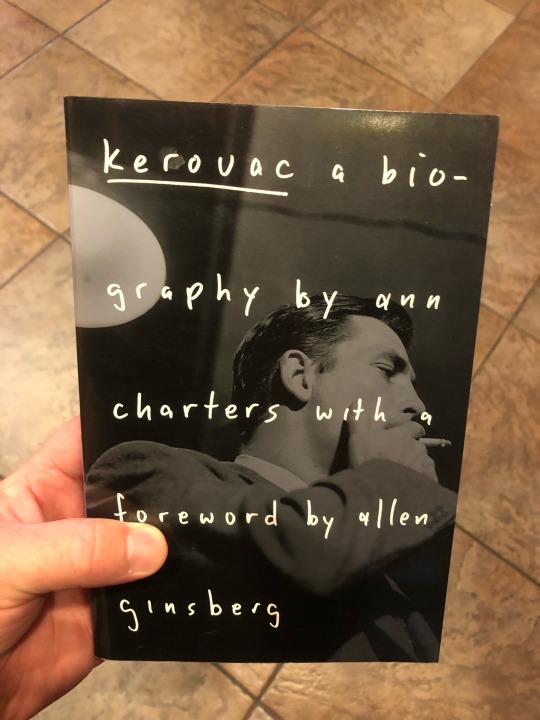
Day #4 - "Kerouac: A Biograpy" by Ann Charters
Although Jack Kerouac experimented sexually (with Neal Cassady, Gore Vidal, and others) he identified as heterosexual. Sorry! But he is queer adjacent!
Let's list some of the queer people you will meet in this book:
Allen Ginsberg (Gay) William Burroughs (Bisexual) Neal Cassady (Bisexual) Gary Snyder (Bisexual) Lucien Carr (Bisexual) Herbert Huncke (Bisexual)
And more!
Jack was raised a strict Catholic, but was introduced to Zen Buddhism by Gary Snyer and became deeply interested in Buddhist teachings, practices, and meditation techniques, incorporating them into his daily life and shaping his spiritual outlook and writing style. Especially in his book "The Dharma Bums," Jack helped popularize Eastern philosophies and spiritual practices in the West, inspiring many to seek alternative paths to spirituality and personal fulfillment.
I'd say my two biggest influences on becoming a Buddhist was #1 Yoda and #2 Jack Kerouac.
And this is the best biography of Jack Kerouac I know of.
Tagging: @wernerherzoghaircut if you want to play along.
35 notes
·
View notes
Text
Assistir Filme Burroughs: The Movie Online fácil
Assistir Filme Burroughs: The Movie Online Fácil é só aqui: https://filmesonlinefacil.com/filme/burroughs-the-movie/
Burroughs: The Movie - Filmes Online Fácil

Uma exploração da história de vida de Burroughs, como contada por Burroughs junto com muitos de seus contemporâneos, incluindo Allen Ginsberg, Brion Gysin, Francis Bacon, Herbert Huncke, Patti Smith, Terry Southern e William Burroughs Jr.
0 notes
Text
Catullus 95

Allen Ginsberg Herbert E. Huncke, author <The Evening Sun Turned Crimson, who introduced "hip" vocabulary & attitudes to writers later labeled "Beat", his room Hotel Elite, N.E. corner 8th Avenue and 51'st street diagonally opposite Madison Square Garden. Rare glimpse of Huncke, then hustling bread on Times Square, strung-out - he fixed at the sink. Saw him infrequently that season, though we'd known each other well since 1945, found his room to say good bye, leaving New York to hitch south, Mexico and Bay area, here just before Christmas,> Manhattan 1953., 1953, printed later
Zmyrna mei Cinnae nonam post denique messem Zmyrna of my Cinna, finally after the ninth harvest quam coepta est nonamque edita post hiemem, which begun after the ninth high water, milia cum interea quingenta Hortensius uno meawhile Hortensius publishhed 500,00 in one year . . . . . . . . . . . . . Zmyrna cauas Satrachi penitus mittetur ad undas, Zmyrna will be sent to the death waves of the Satrachos, Zmyrnam cana diu saecula peruoluent. White age will roll through Zmyrna for a long time. at Volusi annales Paduam morientur ad ipsam but Volusius' annals will die in Pauda itself et laxas scombris saepe dabunt tunicas. and loose mackerels will often be given loose shirts.
parva mei mihi sint cordi monimenta sodalis ... at populus tumido gaudeat Antimacho
allow me small reminders of my heart...
but allow the people to rejoice in swollen Antimachus
0 notes
Text
“His lifestyle WAS his art: the drugs, the prostitution, the homelessness, the years spent in jail - it all bled onto the page and created a new kind of poetry. He was the American Genet: a man with one foot firmly in the criminal underworld and one in literature.”
/ From “The man who set the Beats going” by Tony O’Neill, The Guardian, 2007 /
“I never met Huncke. Yet he speaks to me in a voice of gentle desperation and compassionate understanding on the complexity and fragility of the human condition, generously revealing the stamina of his tortured soul …”
/ From the book So Real It Hurts (2015) by Lydia Lunch /
Unlike Lydia Lunch, I did meet literary bad boy and proto-beatnik Herbert Huncke (9 January 1915 - 8 August 1996), who died on this day. Or, more accurately, I had a fleeting encounter with him. Like so many, I went through a Beat literature phase in my twenties. Huncke (who was on intimate terms with and a primary influence on the likes of William S Burroughs, Allen Ginsberg and Jack Kerouac) gave several readings in London in the early nineties which I worshipfully attended. (I also managed to see Ginsberg). Huncke was a spellbinding raconteur with a worldly-wise WC Fields-style delivery, and so desiccated-looking he suggested an unwrapped, upright ancient Egyptian mummy. After one reading, he autographed my copy of The Evening Sun Turned Crimson (1980). I can pinpoint exactly when because Huncke wrote the date [26 October 1994] above his signature in surprisingly pretty, swirling handwriting.

#Herbert Huncke#beatnik#beatniks#beat literature#beat poetry#lobotomy room#role model#filth elder#the american genet#the american jean genet#jailbird#chelsea hotel#lgbtqia#queer#bad boy#lydia lunch#outsider art
10 notes
·
View notes
Photo

Herbert Huncke, working on William S Burroughs’ New Waverly, Texas marijuana farm, down from New York for the summer, August 1947. Allen had travelled there from Denver with Neal Cassady, expecting Herbert to make sleeping arrangements for them, only to find a single cot in the room for the both of them while Herbert slept on the porch. (photo: Allen Ginsberg, courtesy Stanford University Libraries / Allen Ginsberg Estate / Getty Images) •
42 notes
·
View notes
Photo

Legend
#jack kerouac#william burroughs#allen ginsberg#gregory corso#herbert huncke#diane diprima#carl solomon#neal cassady
26 notes
·
View notes
Quote
The essential problem is that Americans have been lying to themselves for so many years now that they are completely incapable of telling the difference between the rather frightening truth and their mythological view of America.
#america#american#condition#usa#politics#gritty#literature#Bukowski#william s. burroughs#hp lovecraft#allen ginsberg#charles bukowski#jack kerouac#Herbert Huncke#lucien carr#quotes#psychology#philosophy
13 notes
·
View notes
Text
Welcome!
Hey there. My name is Kenneth (he/him). I'm a queer 26-year-old Métis poet. This will be my dedicated writing blog, and contain original work by me only. This includes poems, prose, essays, journal entries, rants, vents, whatever.
If you would like to read all of my work from the past decade, my book is available as a hardcover on Lulu and on Amazon as a softcover.
I am currently looking for an editor! If that sounds of interest to you, please message me or send inquiries to [email protected]. If you’d like to donate, click here.
If you're a writer or lover of literature, like this post or send me a message and I'll be sure to follow you! And if you wanna get to know a little more about me, feel free to keep reading after the cut. 💖
Collections
Juvenilia (2011—2013)
The Hyacinth Boy (2014—2017)
The Pine Draft (2018—2020)
Last Call (2020—Present)
One of my favorite quotes is an (alleged) Chinese proverb, which goes like this:
“The best time to plant a tree is twenty years ago. The second best time is now.”
That’s essentially going to be the philosophy this blog. It’s something I should have started a long time ago, but hey, I might as well start it now. This is difficult for me to do, I’m taking a large step out of my comfort zone with this. I’m not used displaying my real self publicly, but I believe that it’s a good thing to do. Creating this blog will help keep me accountable and focused on what I ought to be doing.
A little bit more about me: Over the past decade, I have been writing under several pseudonyms such as: b.k. blayze, the Hyacinth Boy, the Pine Draft, and Warsaw Mountain. Currently, I'm attending university for a Bachelors of Arts majoring in English with a minor in Creative Writing.
In the past, I have worked as a cook for a children's hospice for several years, created music as a soundtrack producer for an indie game, freelanced and started open-source projects as a web developer, and love experimenting with 35mm film photography outdoors.
My favorite poets and influences are mainly from 19th and 20th century America, including: Walt Whitman, T.S. Eliot, Emily Dickinson, e.e. cummings, William Carlos Williams, Robert Frost, Ezra Pound, as well from the Beat Generation such as: Herbert Huncke, Lucien Carr, Gary Snyder, Neal Cassady, Kaufman, LeRoi Jones, Ginsberg, Burroughs, and Leonard Cohen.
304 notes
·
View notes
Text
(mostly) meeks headcanons because he deserves them
this boy values his hair above anything else
he needs a solid 30 minutes and a lot of hairspray to get the swoop just right
he tried contacts once but he panicked and couldn’t get them out so he’s sticking to his glasses
he sometimes sneaks out of the poets’ weekend study sessions to go to the record store because he doesn’t really need to study
the boys wondered where he kept going to every session so they followed him one day and caught him quietly humming along to sh-boom in a record listening booth
they teased him for weeks after that, loudly singing “life could be a dream, sweethearttt” every time they saw him
he did his own research about poetry outside of keating’s classes because he’s an overachiever like that
and found out about the Beat Generation of poets that was happening right then and he got so excited because they’re living through a transformative moment in the history of American literature
he excitedly told the poets about it at the next meeting and they started discussing the works of Allen Ginsberg, Jack Kerouac, Herbert Huncke, and Lucien Carr
through the influences of the Beat Generation the boys started to become more open with their sexualities and not be so confined to heteronormativity
this is when meeks found out that he was ace
and neil and todd became a thing
the rest of the boys mostly figured themselves out too: cameron is ace and aro, charlie is bi, knox is straight, and pitts is still unsure but he knows he’s queer
he likes to write poems in latin and have charlie translate them during their tutoring sessions
“meeks what the fuck does this mean” “do you want me to keep tutoring you or not”
his name has always been spelled as “stephen” until his parents dug up his birth certificate and found out that his grandmother spelled it as “steven” when writing it down and so now he’s very confused and doesn’t know which one to use
can you tell that i just wanted an excuse to write about the beat generation because oh my god it was literally right there the writers could have done so much with it
#dead poets headcanons#dps headcanons#dps hc#stephen meeks#steven meeks#meeks headcanons#neil perry#anderperry#todd anderson#charlie dalton#gerard pitts#richard cameron#knox overstreet#beat generation
193 notes
·
View notes
Text

Jean-Louis played American football. He was good enough to be offered scholarships to Boston College, Notre Dame and Columbia University. He decided on Columbia University where he promptly broke a leg in his freshman year. The next year, he argued a lot with the coach who kept Jean-Louis benched most of the time.
Well, naturally, Jean-Louis didn't like sitting on the bench, so, he quit school and started hanging out with the likes of Allen Ginsberg, Neal Cassady, John Clellon Holmes, Herbert Huncke and William S. Burroghs.
Jean-Louis wrote first novel, The Sea Is My Brother, in 1942. He thought it was a "crock of shit" and didn't pursue publishing it. The book was eventually published in 2011 some 42 years after Jean-Louis' death and 70 years after he had written it.
2 notes
·
View notes
Text

“Herbert Huncke was the Jean Genet of the Beat Generation. A homosexual poet-thief, he was once as familiar with Times Square dives and New York prisons as he was later to become with fashionable salons and literary landmarks.”
/ From The Independent’s obituary for Herbert Huncke by James Campbell, 1996 /
“His lifestyle was his art: the drugs, the prostitution, the homelessness, the years spent in jail - it all bled onto the page and created a new kind of poetry. He was the American Genet: a man with one foot firmly in the criminal underworld and one in literature.”
/ From “The man who set the Beats going” by Tony O’Neill, The Guardian, 2007 /
“I never met Huncke. Yet he speaks to me in a voice of gentle desperation and compassionate understanding on the complexity and fragility of the human condition, generously revealing the stamina of his tortured soul …”
/ From the book So Real It Hurts (2015) by Lydia Lunch /
Unlike Lydia Lunch, I did meet literary bad boy and proto-beatnik Herbert Huncke (9 January 1915 - 8 August 1996 – born on this day 109 years ago). Or at least I had a fleeting encounter with him. Like so many twenty-somethings, I went through a Beat literature phase. Huncke (who was on intimate terms with and a primary influence on the likes of William S Burroughs, Allen Ginsberg and Jack Kerouac) gave several readings in London in the early nineties which I worshipfully attended. (I also managed to see Ginsberg). Huncke was a spellbinding raconteur with a worldly-wise WC Fields-style delivery, and so desiccated he suggested an unwrapped, upright ancient Egyptian mummy. After one reading, he autographed my copy of The Evening Sun Turned Crimson (1980). I can pinpoint exactly when because Huncke wrote the date [26 October 1994] above his signature in surprisingly pretty, swirling handwriting. Pictured: photo booth shot of Huncke, Times Square, circa 1940 via Ginsberg Collection.
#herbert huncke#beatnik#beat literature#lobotomy room#literary bad boy#literary outlaw#the american jean genet#lgbtqia#queer#outsider artist#the evening sun turned crimson#guilty of everything#lydia lunch#beat generation
46 notes
·
View notes
Text

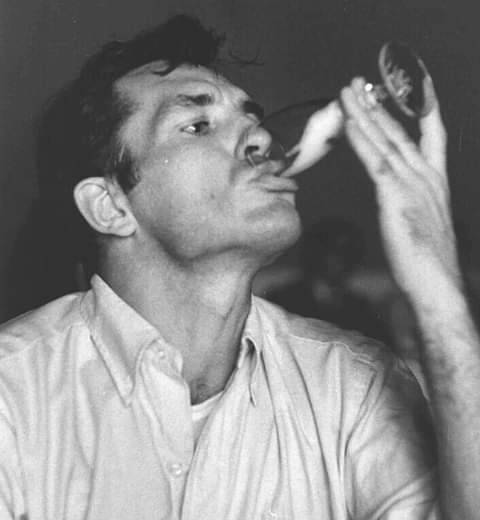

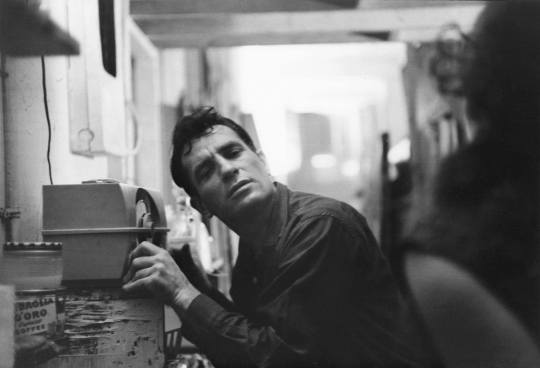

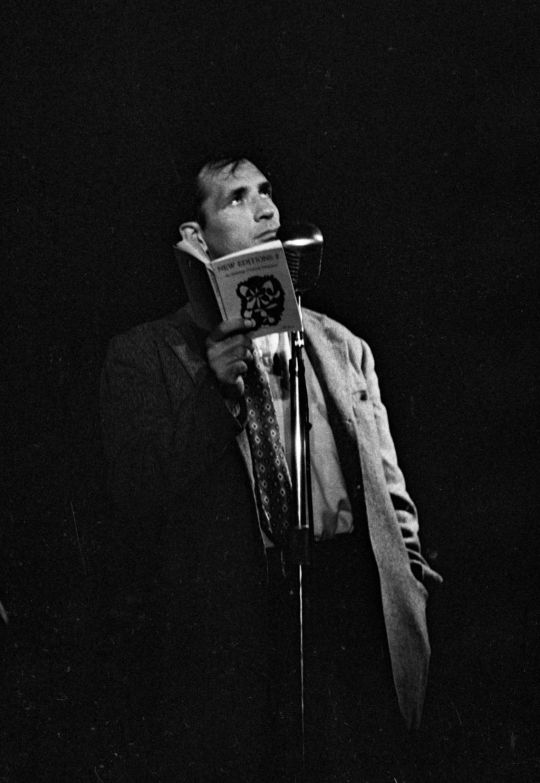



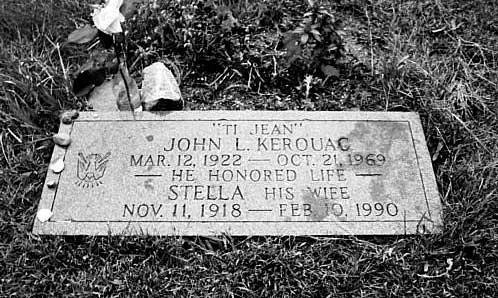
"No puedo cometer suicidio, pero planeo beber hasta matarme"
- JackKerouac
En St.Petersburg, Florida, E.U. Un Día Como Hoy Octubre 21 en 1969, roto enmedio de un alcoholismo crónico fallece a los 47 años de edad Jack Louis Lebris de Kerouac. Novelista, poeta y máximo referente de la Beat Generation
En 1940 Kerouac se matriculó en la Universidad de Columbia, donde conoció a dos escritores que se harían amigos para toda la vida: Allen Ginsberg y William S. Burroughs.
En 1957 público "On the Road" su novela más relevante, la cual tuvo una amplia influencia cultural antes de ser reconocido por sus méritos literarios. On the Road captó el espíritu de su tiempo como ninguna otra obra del siglo XX lo había hecho desde "The Great Gatsby" (1925) de F. Scott Fitzgerald.
Junto con Kerouac, son las figuras seminales del movimiento literario conocido como "Beat" un término introducido a Kerouac por Herbert Huncke, un drogadicto de Times Square, ladrón de poca monta, estafador y escritor. Significaba “down-and-out” así como “beatific”; el fondo de la existencia.
Sus novelas, "The Town & the City" (1950), "Doctor Sax" (1959), "Maggie Cassidy" (1959) y "Tristessa" (1960).
Kerouac también experimentó con los modismos del blues y el jazz en obras como "Mexico City Blues" (1959), un poema secuencial compuesto por 242 coros.
Y se dejó influir del haiku, un género desconocido para los estadounidenses en esa época. A partir del haiku japonés, Kerouac, partiendo de las estenosis de 17 sílabas y 3 líneas, redefinió la forma y creó una tradición haiku americana.
En la colección póstumamente publicada "Scattered Poems" (1971), propone que el "haiku occidental" simplemente diga mucho en tres líneas cortas.
Entre 1953 y 1961 Kerouac se dedicó al estudio y la práctica del budismo, replicando experiencias de antiguos maestros y combinando así las tradiciones orientales y occidentales.
En 1961 escribió "Big Sur" en 10 días y en 1963 "Visions of Gerard". Otro importante libro autobiográfico fue "Vanity of Duluoz" (1968).
El Legado de Kerouac consiste en la insistencia de Kerouac en "El primer pensamiento, el mejor pensamiento" y su negativa a revisarlo fue polémica. Consideraba que la revisión era una forma de mentira literaria, imponiendo una forma más alejada de la verdad del momento, contraria a sus intenciones para sus novelas de la "verdadera vida". Aunque sí que revisaba mediante la reescritura. Kerouac explicó su búsqueda de un lenguaje puro y sin adulterar -la verdad del corazón sin obstrucciones por la mentira de la revisión- en dos ensayos publicados en la revista Evergreen Review: "Essentials of Spontaneous Prose" (1958) y "Belief and Technique for Modern Prose" (1959).
Sobre las frases gramaticalmente irreverentes, Kerouac ensalzó un "método" que renuncia a la puntuación convencional en favor de los guiones.
En "Essentials of Spontaneous Prose" (Esenciales de la prosa espont��nea) recomendó el "vigoroso guión de espacio que separa la respiración retórica (como un músico de jazz que respira entre frases superadas)"; el guión permitía a Kerouac manejar el tiempo de forma diferente, haciéndolo menos prosaico y lineal y más poético.
8 notes
·
View notes
Photo

Outsiders welcome 🚬 Dedicated to all those who have been depressed, butchered, or hung up by all these family unit nazis, fascists, war-freaks, department of License creeps ***
Fuck You: A Magazine of the Arts was an absolutely vital literary magazine founded in 1962 by the poet Ed Sanders and published from a “secret location on the Lower East Side” of New York City. Probably the most important mimeo revolution publication. Sanders’ Peace Eye Bookstore was raided by police on January 1, 1966 and Saunders was charged with obscenity in no small part due to the contents of Fuck You. Notoriety generated by the case led to his appearance on the February 17, 1967 cover of Life Magazine, which proclaimed him "a leader of New York's Other Culture."
LOOK COOL HERE Vol. 5 #5
Includes work by Allen Ginsberg, Robert Kaye, Tuli Kupferberg, Robert Nichols, John Keys, Herbert Huncke, Peter Orlovsky, Diane Wakoski, Jim Standish, Lenore Kandel, Mary Mayo, Julian Beck, Harry Fainlight, Nelson Barr and the editor.
7 notes
·
View notes
Text

Herbert Huncke by Allen Ginsberg
1 note
·
View note
Photo

“Holy Peter holy Allen holy Solomon holy Lucien holy Kerouac holy Huncke holy Burroughs holy Cassady holy the unknown buggered and suffering beggars holy the hideous human angels!” Allen Ginsberg from “Howl”
Herbert Huncke, Godfather of the Beat Generation, was born on this day in 1915. (photo: Herbert Huncke, Times Square, 1953, by Allen Ginsberg)
107 notes
·
View notes